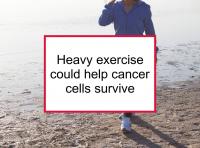A new study has reported that heat shock protein 27 (Hsp27) can prevent cancer cell death in cells with DNA damage induced by radiation. Hsp27 appears to be involved in the survival and recovery of cells exposed to elevated temperature (heat shock), UV radiation, low oxygen concentrations, and other stressful conditions.
DNA damage, which is one result of chemotherapy and radiotherapy, normally results in either the death of the cell or DNA repair and survival of the cell. However, the chemical regulators which determine whether cell death or survival occurs are not well understood. Here, the authors report that hormone receptor positive MCF-7 breast cancer survived UV-induced DNA damage by means of a chemical process assisted by Hsp27.
On the other hand, silencing Hsp27 resulted in enhanced cell death. Hsp27 expression was found to be essential for the survival of MCF-7 breast cancer cells with damaged DNA, implying that events that increase the synthesis of Hsp27 could interfere with cancer treatment by enabling cancer cells to survive.
The experiments showed that Hsp27 could block the process that kills cancer cells even after the cells’ DNA was damaged by radiation. The same was true when the cells were subjected to a common chemotherapy drug. In a related press release, Govindasamy Ilangovan, lead author of the study and associate professor of internal medicine at Ohio State, offered more commentary on the implications of the study. “One of the known inducers of this factor is exercise. We are not against exercise, but the timing is critical.
It looks like any intense or prolonged physical activity a couple of days before the start of cancer therapy is highly risky, and has potential to reduce the benefits of the treatment,” said Ilangovan. Hsp27 enables cells to pause, repair themselves and continue dividing, leading to their survival. Damage to the DNA in cancer cells should disable cell division, but Hsp27 was found to facilitate cell survival. “It looks like a compensatory act. We are doing something to kill the cell, but cells have their own compensatory action to oppose that,” Ilangovan said.
The levels of Hsp27 peaked within two days after irradiation, suggesting that the protein is highly active in the two days following any stressful event that causes an increase in Hsp27 levels. “The process that sets these activities in motion takes a couple of days,” Ilangovan said. “It is not proven in a clinical setting, but our hypothesis leads us to strongly caution cancer patients about avoiding stress because that stress might trigger recurrence of cancer cell growth.”
Please see our articles on doxorubicin, paclitaxel and radiotherapy for information on food and lifestyle choices that will maximize the effectiveness of these treatments.
